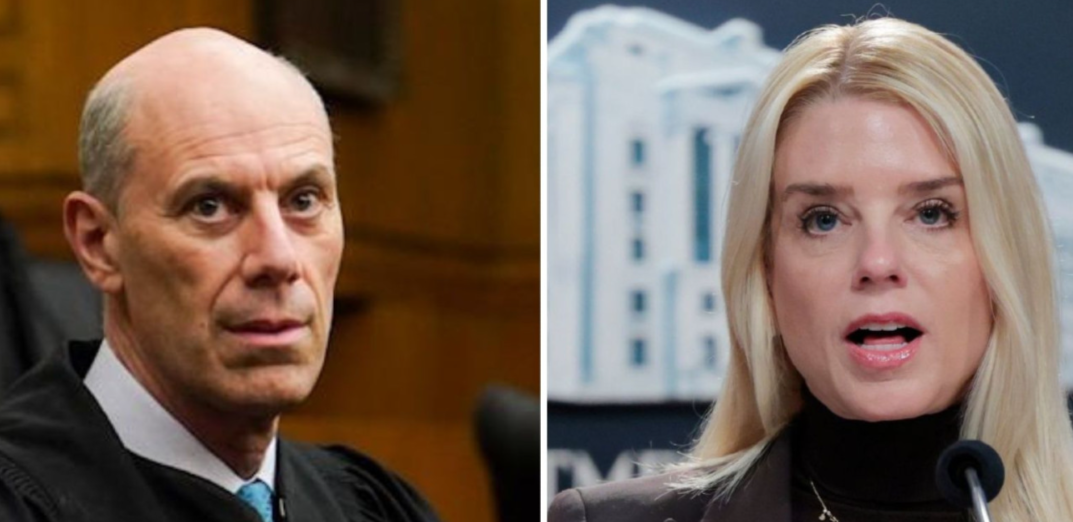DOJ Rips Judge’s ‘Digressive Micromanagement’ In Case On Deportation Flights

The U.S. Department of Justice (DOJ) criticized a federal judge on Wednesday, accusing him of engaging in "digressive micromanagement" in a case concerning deportation flights that transported Venezuelan nationals to El Salvador over the weekend.
U.S. District Judge James Boasberg instructed the DOJ to provide responses to five specific questions after the department asserted on Tuesday that the flights had not breached a court order. The DOJ has since requested additional time to address the inquiries.
"The Court has now spent more time trying to ferret out information about the Government’s flight schedules and relations with foreign countries than it did in investigating the facts before certifying the class action in this case," stated a filing submitted Wednesday, co-signed by Attorney General Pamela Bondi, Deputy Attorney General Todd Blanche, and other officials. "That observation reflects how upside-down this case has become, as digressive micromanagement has outweighed consideration of the case’s legal issues."
"The distraction of the specific facts surrounding the movements of an airplane has derailed this case long enough and should end until the Circuit Court has had a chance to weigh in. The Government respects this Court and has complied with its request to present the Government’s position on the legality of the Court’s [Temporary Restraining Order] and the Government’s compliance with that TRO," the filing continued.
On Tuesday, Boasberg had ordered the DOJ to answer five key questions and submit sworn declarations under seal by noon on Wednesday: "1) What time did the plane take off from U.S. soil and from where? 2) What time did it leave U.S. airspace? 3) What time did it land in which foreign country (including if it made more than one stop)? 4) What time were individuals subject solely to the Proclamation transferred out of U.S. custody? and 5) How many people were aboard solely on the basis of the Proclamation?"
However, in its latest filing, the DOJ indicated that "Defendants are currently evaluating whether to invoke the state secrets privilege as to portions of the information sought by this Court’s order."
"Whether and how to invoke that privilege involves both weighty considerations and specific procedures that are not amenable to the 21-hour turnaround period currently provided by this Court’s order," the DOJ added.
According to the DOJ, "The underlying premise of these orders, including the most recent one requiring the production of these facts ex parte today at noon, is that the Judicial Branch is superior to the Executive Branch, particularly on non-legal matters involving foreign affairs and national security. The Government disagrees. The two branches are coequal, and the Court’s continued intrusions into the prerogatives of the Executive Branch, especially on a non-legal and factually irrelevant matter, should end."
Additionally, the DOJ stated that "disclosure of the information sought could implicate the affairs of United States allies and their cooperation with the United States Government in fighting terrorist organizations" and that "such disclosure would unquestionably create serious repercussions for the Executive Branch’s ability to conduct foreign affairs."
The DOJ argued that "What began as a dispute between litigants over the President’s authority to protect the national security and manage the foreign relations of the United States pursuant to both a longstanding Congressional authorization and the President’s core constitutional authorities has devolved into a picayune dispute over the micromanagement of immaterial factfinding."
This legal confrontation follows Boasberg’s verbal issuance of a 14-day restraining order on Saturday night, effectively halting the Trump administration’s efforts to deport individuals allegedly affiliated with Tren de Aragua.
The ruling was prompted by human rights advocates who contended that some Venezuelan nationals with legitimate asylum claims might be deported despite having no confirmed links to the criminal organization.
The Trump administration, however, maintained that the judge’s written order was finalized only after two planes carrying suspected gang members had already taken off, making it too late to recall them. A third plane, which departed after the initial two, did not contain any individuals deported under the Alien Enemies Act, according to the administration.
"All of the planes that were subject to the written order, the judge’s written order, took off before the order was entered in the courtroom on Saturday," White House press secretary Karoline Leavitt stated on Monday, asserting that the White House had not violated any order.
Later that same day, during a courtroom hearing, the judge challenged the administration’s argument, as reported by The Associated Press, asking the U.S. attorney, "I’m just asking how you think my equitable powers do not attach to a plane that has departed the U.S., even if it’s in international airspace."
In response to the judge’s actions, a Republican member of the House has introduced articles of impeachment against Boasberg for blocking the deportation flights under the Alien Enemies Act.